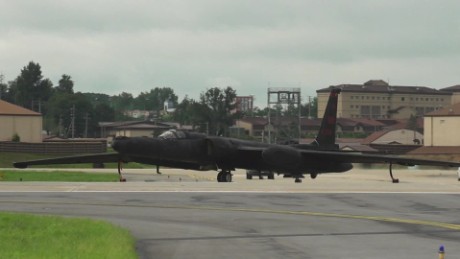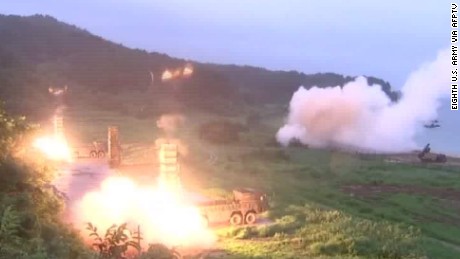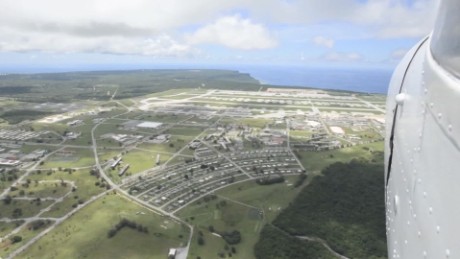US military chief in Pacific: Testing our forces would be 'foolhardy'
Osan Air Base, South Korea (CNN)The top American military commander in the Indo-Pacific region said Tuesday it would be "foolhardy" for adversaries of the United States to try to take advantage of any perceived weaknesses in US operational capacity.
The comments from Admiral Harry Harris, the head of US Pacific Command (PACOM), came a day after the USS John McCain collided with a merchant ship, leaving 10 sailors missing and another five injured. It was the fourth such accident involving a US military ship in Asia this year -- and has prompted questions about the operational capabilities of US forces in the region.
"Perception is in the eyes of the beholder, and I will hope that no one will test the US on the perception that we've had a problem with USS John McCain and three other assets -- that would be a very foolhardy thing to do," Harris told reporters at a news conference Tuesday.
Harris' comments come amid continued tensions on the Korean Peninsula, with Washington and Pyongyang trading heated rhetoric and dueling threats. Observers worry that a miscalculation on either side could have serious consequences.
Tuesday was the second day of the Ulchi Freedom Guardian exercises, joint military drills between the US and South Korea that both sides say are defensive in nature but draw the ire of the North Korean regime, who view them as practice for an eventual invasion.

Spy planes keep an eye on North Korea 02:33
Operational pause
Harris said he believed the McCain's collision would not affect the US military's ability "to defend the (Korean) peninsula and our interest in the region."
"The US Navy is large, we have a lot of capacity, and we will bring that capacity forward if we need to," he said.
USS John McCain collision: Full coverage
- Navy plans 1-day operational pause
- Spate of accidents in Asia
- Why are so many Navy ships crashing?
- Collision sheds light on territorial dispute
The US Navy ordered a one-day operational pause -- which will be spread out over a couple weeks and conducted at the discretion of individual commands -- in response to the McCain collision, but Harris stressed that the string of incidents will not affect the US military's ability to defend itself from incoming threats.
The John McCain is equipped with the Aegis missile defense system, which is designed to shoot down ballistic missiles from adversaries like North Korea.
A spokesman for the Pacific-based US 7th Fleet said the McCain is one of 14 Aegis-equipped ships the Navy has forward-deployed to Japan, and it plans to add another one next year. In total, the US Navy has 84 vessels equipped with the Aegis system.
"The ballistic missile defense destroyers and cruisers we have in the region are only part of the layered defense we have in the region," said Gen. Vincent K. Brooks, the commander of US Forces Korea.

What's next for Navy after USS McCain crash? 05:17
Open eyes and ears
Flanked by two Patriot missile batteries -- another missile defense system designed to shoot down incoming projectiles -- Harris spoke Tuesday at Osan Air Base just south of Seoul.
The news conference came on the second day of the annual Ulchi Freedom Guardian joint military exercises between the American and South Korean militaries.
Seoul and Washington say the exercises, which have been going on for years, are meant to "enhance readiness, protect the region and maintain stability on the Korean Peninsula," according to the US Department of Defense.
North Korea, however, sees them as practice for an eventual invasion.
A propaganda video released by North Korea's state-run Uriminzokkiri website Saturday, shortly before the start of the exercises, showed senior US leaders -- including Vice President Mike Pence, Secretary of State Rex Tillerson and Secretary of Defense Jim Mattis -- above flames and warned the Trump administration to keep "its eyes and ears open from now on."

North Korea makes threat about annual exercise 01:21
The provocative video also appeared to show a missile heading toward the US territory of Guam, an island in the western Pacific that's home to two US military assets, and speculated that "this is the fateful end of sinful US."
Why is North Korea threatening to attack Guam?
- The tiny Pacific island, the largest in the Marianas group, is home to two significant US military bases.
- Bomber sorties flown above South Korea Tuesday originated from Guam's Andersen Air Force Base.
- Around 5,000 US military personnel are based on the island, which is a US territory.
- It is often referred to as the "tip of the spear" and home to the US' most westerly military installations.
- Except US bases in Japan and South Korea, it's the closest US base to North Korea.
Guam, which is the closest US territory to North Korea, was ensnared in last week's heated back-and-forth between Pyongyang and the United States after being specifically threatened by North Korean state media.
The tense rhetoric has died down somewhat since last Tuesday, when North Korea's state-run news outlet KCNA reported that North Korean leader Kim Jong Un would opt to wait and see what the "foolish Yankees" do next after being briefed by his military advisers on plan to fire missiles off the coast of Guam.
As the threats rolled, US and Guam officials have reiterated that the multi-layered missile defense system the US operates throughout Asia is designed to keep Guam safe from threats like these, though independent analysts have issued more cautious assessments.

What you need to know about Guam
Harris and Brooks offered strong praised US' missile defense systems Tuesday, both made it clear that the current situation on the Korean Peninsula must be resolved diplomatically.
"We hope and we work for a diplomatic solution to the challenge presented by Kim Jong Un. A strong diplomatic effort, backed by a strong military effort, is key," Harris said. "Credible combat power should be in support of diplomacy, not the other way around."
CNN's Elaine Ly, Sol Han and Brad Lendon contributed to this report
News Courtesy: www.cnn.com











